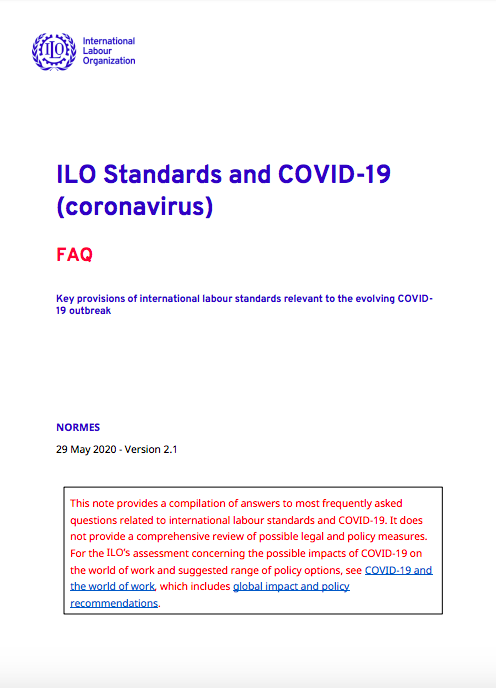The International Labour Organization maintains a system of international labour standards (ILS) aimed at promoting opportunities for all to obtain decent and productive work, in conditions of freedom, equity, security and dignity. International labour Standards are a useful decent work compass in the context of the crisis response to the COVID-19 outbreak. Firstly, respecting key provisions of ILS relating to occupational safety and health, working arrangements, protection of specific categories of workers, nondiscrimination, social security or employment protection ensures that workers, employers and government can maintain decent work while adjusting to the socio-economic consequences of the COVID-19 pandemic. Secondly, a wide range of ILO labour standards on employment, social protection, wage protection, SMEs promotion or workplace cooperation. contain specific guidance on policy measures that would encourage a human-centred approach to the crisis and to its recovery. Their guidance extends to the specific situation of certain categories of workers, such as nursing personnel, domestic workers, migrant workers, seafarers or fishers, who we know are very vulnerable in the current context. Respect for these standards further contributes to a culture of social dialogue and workplace cooperation that is key to building the recovery and preventing a downward spiral in employment and labour conditions during and after the crisis. ILS establish a fair and equitable framework and embody resilience in front of concrete situations in the world of work and are fundamental to any long lasting and sustainable response to pandemics including COVID-19. Developed, periodically reviewed and, where needed, revised over the past century, ILS respond to the changing patterns of the world of work, for the purpose of the protection of workers, and taking into account the needs of sustainable enterprises. In 2019, the Centenary Declaration for the Future of Work reaffirmed that the setting, promotion, ratification and supervision of ILS is of fundamental importance to the ILO. All ILO legal instruments lay down the basic minimum social standards agreed upon by all the players in the global economy. Countries may implement higher levels of protection and enhanced measures so as to better mitigate the impact of the crisis. This compilation answers most frequently asked questions related to ILS and COVID-19 and aims at supporting governments, employers and workers’ adjustment and responses to the COVID-19 pandemic.

